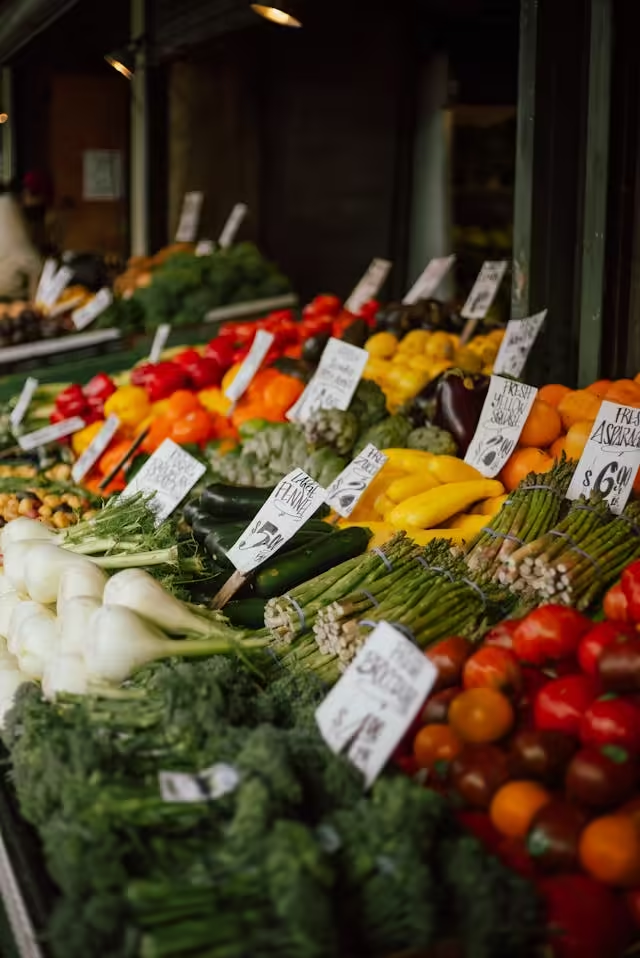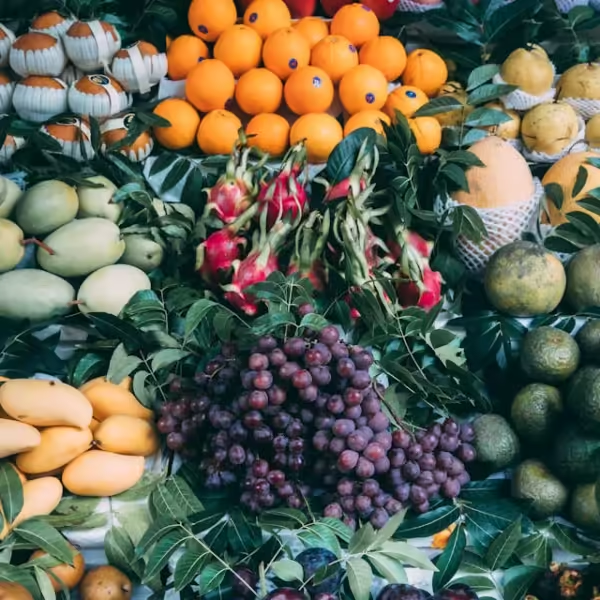Melbourne’s Farmers Markets
Melbourne’s farmers markets are important for the local community because they are fun places to find fresh, locally grown food. These markets connect shoppers directly with farmers and help create a sense of community. With many stalls selling fresh fruits and vegetables, meats, dairy, and handmade goods, visitors can explore a colorful atmosphere that showcases the best of what the region has to offer.
Benefits of Shopping at Farmers Markets
Shopping at these markets has many benefits. First, when people buy directly from farmers, the produce is fresh and often picked just hours before it arrives. This makes the food taste better and healthier, too.
Plus, buying local food helps the environment by reducing the energy used to transport food from far away. When people choose locally grown products, they support local farms and help keep them strong.
Table of Contents
ToggleSeasonal Variety and Food Appreciation
Melbourne’s farmers markets also show off the many types of local produce available. Shoppers can find seasonal items that might not be sold in supermarkets. This focus on seasonal produce helps people make smart choices about what they eat and helps them appreciate their food more. Also, by meeting the farmers who grow their food, shoppers learn about how it is made and the hard work that goes into it.
Vibrant Atmosphere and Community Connection
The lively atmosphere of these markets, filled with live music and community gatherings, makes shopping fun and enjoyable. These friendly places not only encourage people to buy good products but also help build connections between community members.
Supporting Local Economy
In the end, by visiting Melbourne’s farmers markets, people can enjoy a great shopping experience. They support fresh food while also helping the local economy grow.
Top Farmers Markets in Melbourne
Melbourne hosts a variety of farmers markets that meet the community’s need for fresh, locally grown produce. Among the best are the Flemington Farmers Market and the Coburg Farmers Market. Both of these markets offer fun shopping experiences and focus on supporting local farmers.
Flemington Farmers Market
Every second Saturday of the month, the Flemington Farmers Market takes place at the Flemington Racecourse. This market has a lively atmosphere with over 50 stalls offering organic fruits, vegetables, ethically raised meats, and handmade goods. Visitors can see colorful displays of seasonal produce, like berries in the summer and squash in the fall. Local farmers proudly showcase their harvests here, allowing guests to connect directly with the people who grow their food.
Seasonal Produce and Sustainability
In addition to fresh food, the Flemington Farmers Market promotes sustainability. This means they encourage seasonal eating and try to reduce the distance food travels before reaching customers. Community engagement is important because the market offers cooking demos and workshops that teach people to prepare and store food. These sessions help shoppers learn how to use their fresh ingredients while reducing waste.
Community Events and Activities
The market also features live music from local musicians, making it a fun place to visit. Families enjoy activities for kids, like arts and crafts, that help children connect with nature and learn about food.
Coburg Farmers Market
Another great market is the Coburg Farmers Market, which takes place every Saturday at the Coburg North Primary School. This market is known for its variety of fresh produce, including local fruits and vegetables, homemade baked goods, and delicious sauces. Shoppers can find everything from farm-fresh eggs and dairy products to unique items like jams.
Diverse Offerings from Local Producers
With a focus on sustainability and supporting local businesses, Coburg Farmers Market gives over 50 stallholders a spot to showcase their food products. Many of these stallholders come from family-run farms that have been in the community for years. This not only allows shoppers to enjoy fresh food but also helps them understand the stories behind what they buy.
Family-Friendly Environment
The market is family-friendly and often hosts live music and fun activities for kids, which helps build community spirit. Local artists sometimes display their crafts, adding a creative touch to the shopping experience. Shoppers can talk to farmers who are excited about their products and ask questions about how their food is grown.
Supporting Local Farmers and Healthy Choices
Both of these markets show Melbourne’s commitment to supporting local farmers and promoting healthy food choices. They are important places for anyone interested in fresh produce and community involvement. These markets help create connections between consumers and producers, making the local food system stronger.
A Must-Visit Experience
By visiting these farmers markets, people can enjoy tasty food and feel good about helping their community and the environment. Whether they are shopping for fresh ingredients, enjoying live music, or learning about sustainable practices, Melbourne’s farmers markets offer something for everyone.
What to Look For at Farmers Markets
When you visit farmers markets, it’s important to know what to look for in fresh produce. High-quality fruits and vegetables should have bright colors, which usually means they are ripe and good for you. For example, tomatoes should be a deep red, while leafy greens should be a rich green color, showing that they are fresh. Also, the produce should have nice smells that remind you of the farm; fragrant herbs and ripe fruits often have a strong scent that shows their quality.
Choosing Quality Fruits and Vegetables
When picking fruits and vegetables, be aware of their texture, too. For example, apples should be firm and crunchy, while peaches should feel a little soft when you gently squeeze them, showing they are ripe.
Always avoid produce with bruises, soft spots, or mold, as these signs mean the food may not be fresh. Look for local fruits and vegetables that are in season. They usually taste better and are fresher than those that have traveled from far away.
Importance of Organic Options
It’s also important to think about organic options. Organic products are grown without synthetic pesticides and fertilizers, which can be better for the environment and your health. Organic farming practices help keep the soil healthy and support wildlife.
While organic produce isn’t always available, it’s a good idea to ask local vendors if they have organic choices. If organic farming is important to you, talking to the vendors can help you learn about how they grow their food.
Considering Free-Range Options
If you see free-range products, consider choosing them. Free-range eggs and meats usually come from animals that are raised in more natural conditions. They are often treated more humanely, which can lead to better taste.
For example, free-range eggs tend to have brighter yolks and a richer flavor than regular eggs. Choosing these items can also support local farmers who follow ethical practices.
Engaging with Vendors
Talking to vendors is an important part of the farmers market experience. Building relationships with the people who grow your food helps you understand where your food comes from and creates a sense of community. When you ask questions about how they farm, you can learn about their methods, what’s in season, and more. This can help you discover new foods to try and encourage you to make more sustainable choices.
Tips for Conversations with Vendors
Don’t be afraid to ask vendors for cooking tips or recipe ideas while you shop. Many love to share their favorite ways to prepare the food they sell, which can make your visit even more enjoyable. You can also ask about the stories behind their products. Learning these stories can give you a greater appreciation for the food and the hard work that goes into growing it.
The Role of Fresh Herbs and Specialty Items
When you explore farmers markets, make sure to check out fresh herbs and special items. Fresh herbs can really enhance the flavors of your meals and often smell better than dried ones. Look for herbs like basil, cilantro, and parsley, which can add excitement to your cooking. Specialty items like unique cheeses, homemade jams, and tasty snacks can also make your shopping experience more interesting and introduce you to new flavors.
Supporting Local Agriculture
By being informed and aware, shoppers can enjoy the variety that farmers markets offer while supporting local agriculture. Shopping at these markets helps the local economy because you are directly helping small farms stay in business. Plus, these markets help create a stronger and more sustainable food system for the future.
A Comprehensive Experience
In the end, exploring the farmers market with knowledge in mind will help you find the best products while connecting with your community. The experience goes beyond just shopping; it’s about celebrating fresh food, local farmers, and the connections that bring people together. By understanding what to look for at farmers markets, you can make smart choices that benefit your health and the environment.
Supporting Local Communities Through Farmers Markets
Farmers markets serve as a vital hub for supporting local communities by helping economic development and promoting sustainability. These markets provide a direct link between shoppers and local farmers, allowing customers to buy fresh, organic produce while helping the farmers in the community.
When shoppers choose to buy at farmers markets, they often support the local economy more directly than when shopping at larger stores. Studies show that, on average, for every dollar spent at a farmers market, about 60 cents stays in the local economy. This is known as the multiplier effect, and it helps make the community stronger. It allows farmers to invest in their farms and create new jobs.
Economic Development
Farmers markets play a big role in helping the economy. When people buy from these markets, they keep money in their local community. This money helps local farmers and small businesses grow and succeed.
Because of this support, farmers can invest in their farms, buy new equipment, and create new jobs. As a result, the entire community becomes stronger and healthier.
Educational Programs and Awareness
Additionally, farmers markets often host community events, workshops, and educational programs that teach people about the importance of supporting local agriculture. These activities help consumers learn about the benefits of sustainable practices and making good food choices. When shoppers understand where their food comes from, they become more connected to the farms that help their communities. This knowledge encourages people to choose local products instead of food from large farms, which leads to a better future for everyone.
Collaboration Among Local Producers
Farmers markets also provide a space for both new and experienced farmers to showcase their products. This friendly environment builds community and teamwork among local vendors. By networking and sharing resources, small farmers can find support and grow their businesses.
Farmers markets create a local food system that not only improves access to fresh food but also highlights the hard work of local farmers and artisans. This way, their efforts in the community are recognized and valued.
Building Stronger Communities
In conclusion, farmers markets are more than just places to buy food. They are important for supporting local communities. By helping economic growth, offering educational chances, and encouraging teamwork among producers, farmers markets create stronger connections. When people support these markets, they help their local economy, promote sustainable practices, and work toward a healthier future for everyone.
¦The information in this article may become outdated due to the passage of time. If you notice any errors, please inform us in the comments. This will help us maintain accurate information for our guests¦
Frequently Ask Questions about Melbourne’s Best Farmers Markets for Locally Sourced Produce
Question: Why are farmers markets important for Melbourne’s community?
Answer: They connect shoppers directly with farmers, creating a sense of community and providing fresh, locally grown food.
Question: What is one benefit of shopping at farmers markets?
Answer: The produce is often fresher, as it is picked just hours before arriving at the market.
Question: How do farmers markets help the environment?
Answer: They reduce the energy used to transport food from far away, promoting sustainability.
Question: What can shoppers find at Melbourne’s farmers markets that supermarkets may not have?
Answer: Shoppers can find a wide variety of seasonal produce that might not be available in supermarkets.
Question: How do Melbourne’s farmers markets promote sustainability?
Answer: They encourage seasonal eating and reduce the distance food travels to customers.
Question: Where is the Flemington Farmers Market held?
Answer: It is held at the Flemington Racecourse every second Saturday of the month.
Question: What type of activities does the Flemington Farmers Market offer?
Answer: It offers cooking demos, workshops, live music, and arts and crafts for kids.
Question: Where is the Coburg Farmers Market located?
Answer: It is located at Coburg North Primary School and takes place every Saturday.
Question: What unique items can shoppers find at the Coburg Farmers Market?
Answer: Shoppers can find farm-fresh eggs, homemade baked goods, jams, and sauces.
Question: How do farmers markets help local farmers?
Answer: They allow farmers to directly sell their produce, helping them grow their farms and invest in their businesses.
Question: What should shoppers look for when choosing fresh fruits and vegetables?
Answer: Shoppers should look for bright colors, firm textures, and fresh smells to ensure high-quality produce.
Question: Why is it important to consider organic options at farmers markets?
Answer: Organic options are grown without synthetic pesticides and fertilizers, which is better for the environment and health.
Question:What are free-range products, and why should shoppers consider them?
Answer: Free-range products come from animals raised in natural conditions, often leading to better taste and humane treatment.
Question:Why is engaging with vendors at farmers markets important?
Answer: Talking to vendors helps build relationships, provides insights into food production, and encourages sustainable choices.
Question: How do farmers markets support local economic development?
Answer: Farmers markets keep money within the local economy, helping farmers invest in their farms and creating new jobs.




